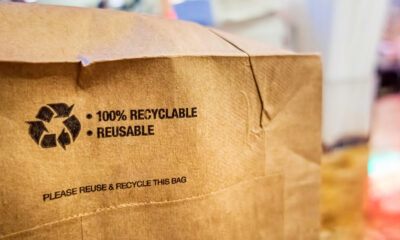

Features
Is it alright to shop ‘til you drop?
It is well known that the fashion industry is less than perfect when it comes to ethics and the environment, but has that started to change? Charlotte Reid looks at the world of sustainable fashion.
Clothing is worth £500 billion globally and, according to the Department for Environment, Food and Rural Affairs (Defra), around 2m tonnes of clothing is bought every year in the UK alone.
It is well known that the fashion industry is less than perfect when it comes to ethics and the environment, but has that started to change? Charlotte Reid looks at the world of sustainable fashion.
Clothing is worth £500 billion globally and, according to the Department for Environment, Food and Rural Affairs (Defra), around 2m tonnes of clothing is bought every year in the UK alone.
However, one fifth of the UK’s clothing market is the fast and discount clothing sector, clothes that are cheap, low quality and have a short lifetime.
So even though it is well known that parts of the fashion industry are exploiting their workers and using sweatshops, this behaviour doesn’t seem to be deterring customers.
However, there has been a growing trend in the idea of sustainable fashion, which has less impact on the environment using organic fibres, reusing unwanted clothing and then recycling it.
This trend grew out of the late 1980s, at a similar time to when people started to develop an interest in sustainable architecture and ethical consumerism.
It wasn’t until the 1990s that the public found out about the existence of sweatshops being used to make clothing.
Since then, there have been revelations that Primark has been linked numerous times to poor conditions for workers, in developing countries as well as in the UK, as well as many other high street names.
Cost vs ethics
According to a 2010 Barclays report into the current trends in the fashion industry, 57% of the population regularly use value clothing retailers, compared to 27% in 2000.
Even Blue & Green Tomorrow has previously pointed out that sustainable fashion isn’t cheap.
The report says that the trend used to be that shoppers would choose value clothes shops because they were saving money. But now, as retailers have become more fashion conscious, and there is less snobbery about where clothing is purchased from, even affluent shoppers are attracted to the cheap clothes retailers because it is a fashion savvy choice.
‘Cool and desirable’
Although the idea of sustainable and recycled clothing may sound odd, it does have a great scope for creativity.
Blue & Green Tomorrow has previously looked at organic clothing designed by prisoners in Eastern Europe and a dress made from seaweed.
Chinti and Parker, the creators of the seaweed dress said, “It appears that more and more brands are creating organic or ethical garments so it’s only a matter of time before barriers are broken down and the reputation of organic and ethical is redefined as something cool and desirable”.
However, it is best to be wary as the market of recyclable clothing grows. Franz Koch, boss of sports company Puma, told the German business magazine Wirtschaftswoche that he is “confident that in the near future we will be able to bring the first shoes, T-shirts and bags that are either compostable or recyclable to the market”.
However, you have to take the whole package into consideration, and although Puma might be making recycled trainers they are still associated with unethical behaviour, like sweatshops.
Cheap chic
The recent trend is to go trawling through charity shops finding treasure in amongst someone else’s trash.
Sarah Farquhar, Oxfam’s head of retail brand, says “A charity shop plays a very different role to a high street retailer. It becomes part of the fabric of the local community and in fact can only be successful when welcomed and embraced by the neighbourhood in which it operates”.
To encourage people into recycling their clothes more Oxfam hosted a one off special event. The One Day Wardrobe Clearout, which took place in September 2011, called on Marks and Spencer customers to all clear out their wardrobes one weekend and give what they didn’t want any more to Oxfam.
Farquhar explains the positives of using charities as offering “the public a way to change countless lives around the world by converting their unwanted goods into cash, so we have to be accountable to the people who support us.
“Our core goal at all times is to raise as much money as possible for our work fighting desperate poverty around the world, something we simply couldn’t do without the support of Britain’s local communities.”
Fashion role models
But the fashion industry’s impact on the environment goes further than creating eco-friendly clothing. Recently Dame Vivienne Westwood, the British fashion designer best known for making punk and new wave fashion mainstream, pledged £1 million to help tackle climate change.
Speaking before climate change talks started in Durban, South Africa, the designer told The Times that she was prompted into acting because “Governments … are so slow that we can’t wait for them anymore. We have to get this thing moving and hope that they’ll join in”..
Although politicians’ other halves may not be inspiring environmental behaviour at the COP17 talks, or the government itself living up to the dream to be the “greenest ever Government”, some of the UK’s politicians wives have created their own influence over eco-fashion.
But the industry needs to be thinking about the future.
Hannah Jones, vice president sustainable business and innovation at Nike, said, in the Fashion Futures report that, “Companies need to be seeding innovation and new ideas now in order to thrive in a resource-constrained world. We need thought provoking research like Fashion Futures to help us collaborate and advocate for the right future solutions around the most important issues on sustainability”.
A recent study into British Social Attitudes showed that the public’s support for fighting climate change had dropped dramatically.
One of the reasons given was that people are suffering from environmental fatigue and no longer see the battle as something personal to them. But what can be more personal than the shirt on your own back?
If you want to know more shopping ethically in time for Christmas then check out our in-depth report into having an ethical Christmas. Or have a look at our guide to ethical shopping to give you further detail and inspiration.


 Environment12 months ago
Environment12 months agoAre Polymer Banknotes: an Eco-Friendly Trend or a Groundswell?

 Features11 months ago
Features11 months agoEco-Friendly Cryptocurrencies: Sustainable Investment Choices

 Features12 months ago
Features12 months agoEco-Friendly Crypto Traders Must Find the Right Exchange

 Energy11 months ago
Energy11 months agoThe Growing Role of Solar Panels in Ireland’s Energy Future




























